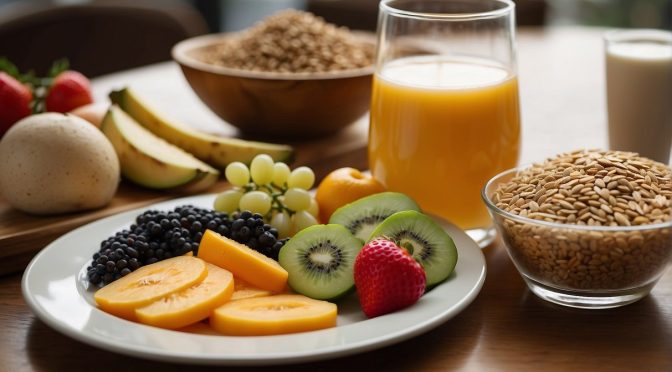Recovery nutrition is crucial. It helps your body recover after activity. You must refuel your muscle cells and tissues after exercising. This is crucial for replacing energy, fixing muscle, and ensuring recovery. This process can greatly affect your optimal performance in later workouts. It hinges on the timing, quality, and balance of nutrients you eat.
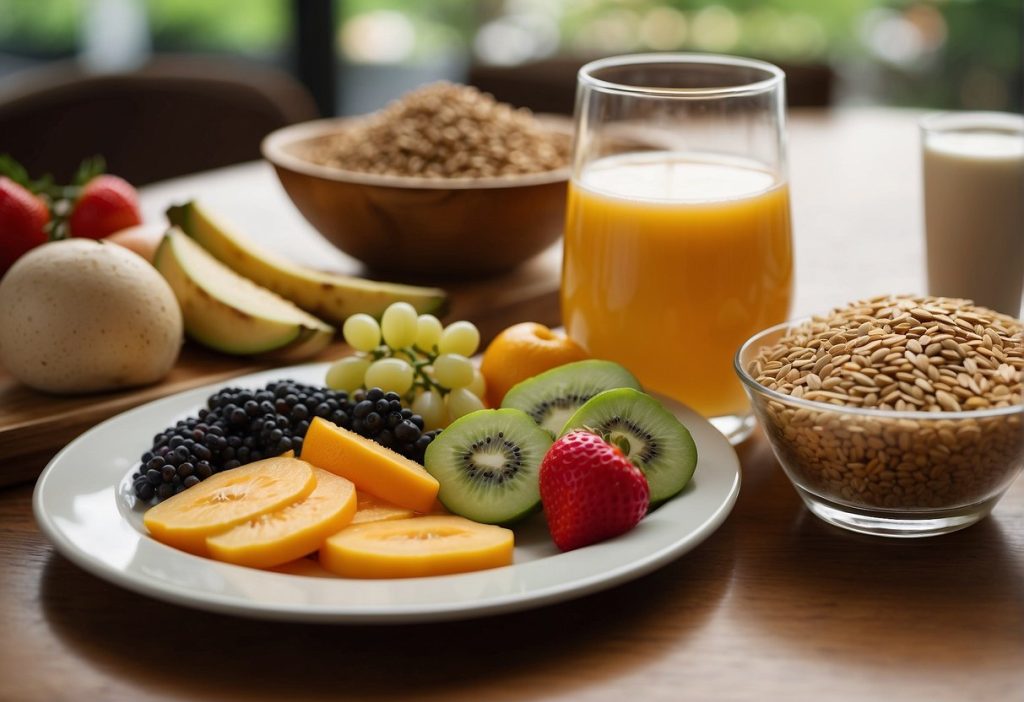
Your body needs carbohydrates to restore glycogen. It is the main fuel used during moderate to high-intensity exercise. Protein is vital for repairing muscle. Strenuous exercise stresses and builds the tissue. Both macronutrients work synergistically to enhance your body’s recovery. Hydration is another key. We cannot overlook it. It supports metabolism and nutrient transfer in your body.
To recover fast, eat a meal or snack with carbs and protein. Do this soon after exercise. This diet can reduce muscle soreness and boost your immune system. It also helps your body adapt to training sessions. This leads to better physical performance and less risk of injury. Balancing your diet with a variety of nutrients ensures your recovery is as effective as it can be.
Importance of Recovery Nutrition in Athletic Performance and Muscle Repair
Good nutrition after exercise is critical. It is key for your performance and for repairing muscles. After intense activity, your body needs nutrients. It needs them to repair, rebuild, and strengthen muscle fibers. Eating the right mix of proteins and carbs in a timely way can greatly affect your optimal recovery.
Proteins are the building blocks of muscle repair. After a workout, your muscles need protein. It repairs the microtears caused by exercise. Eat high-quality protein sources. These include lean meats, dairy, and plant-based options like legumes and quinoa. They help with gaining muscle mass.
Carbohydrates replenish your body’s energy stores. Your muscles use glycogen as fuel during hard exercise. Afterward, people use up these stores. Eating carbohydrate-rich foods like fruits, whole-grain bread, rice, or potatoes helps. It restores muscle glycogen stores, for faster recovery and less fatigue.
Hydration is another pivotal aspect of recovery nutrition. Intense workouts can lead to fluid and electrolyte loss through sweat. Drinking water and some electrolyte-rich fluids helps you stay hydrated. This is key for healthy muscles.
- Protein Intake: 20-40 grams post-workout
- Carbohydrate Intake: Aim for a 3:1 ratio of carbohydrates to protein
- Hydration: Drink 16-24 ounces of water for every pound lost during exercise. Do this to replace lost fluids.
Timing your post-exercise recovery nutrition also holds importance. Eat a recovery meal or snack within 45 minutes after your workout. This will maximize the benefits. This timing helps ease muscle repair and growth while adequately restoring energy levels. Remember, each person’s needs can vary. Adjust your nutrition based on your workout intensity and your goals.
Understanding the Recovery Process
Your body’s ability to recover after exercise is crucial. Muscle repair, strength building, and performance enhancement need it. Proper nutrition plays an essential role in supporting this natural physiological process.
Overview of the Body’s Natural Recovery Process After Exercise
After exercising, your body starts a series of biological functions. They aim to fix muscle protein breakdown and refill your energy deficit. The recovery phase involves:
- Muscle Protein Synthesis (MPS): Your body repairs damaged muscle fibers by synthesizing proteins. This is critical for muscle recovery and growth.
- Glycogen Replenishment: Exercise depletes glycogen, your body’s stored form of glucose. Recovery involves restoring these reserves to fuel future physical activity.
- Reducing Inflammation: Exercise-induced stress leads to a inflammatory response from your body. Recovery aims to cut this response and help healing.
Role of Nutrition in Enhancing the Recovery Process
Your dietary choices post-exercise can significantly influence the effectiveness of the recovery process. Key nutritional strategies include:
- Carbohydrate Intake: Consuming carbohydrates post-exercise replenishes glycogen stores. Aim for 1.0–1.2 grams of carbohydrate per kilogram of body weight within the first 30 minutes post-exercise.
- Protein Consumption: To promote MPS, include a dietary protein source in your recovery meal. 15–25 grams of high-quality protein after working out aids in effective muscle breakdown repair.
- Hydration: Fluid loss through sweat impacts recovery. Replace lost fluids by drinking water and beverages containing electrolytes.
Eat a mix of carbs, proteins, and fluids after you exercise. It will aid your body’s recovery.
Muscle Soreness and Recovery
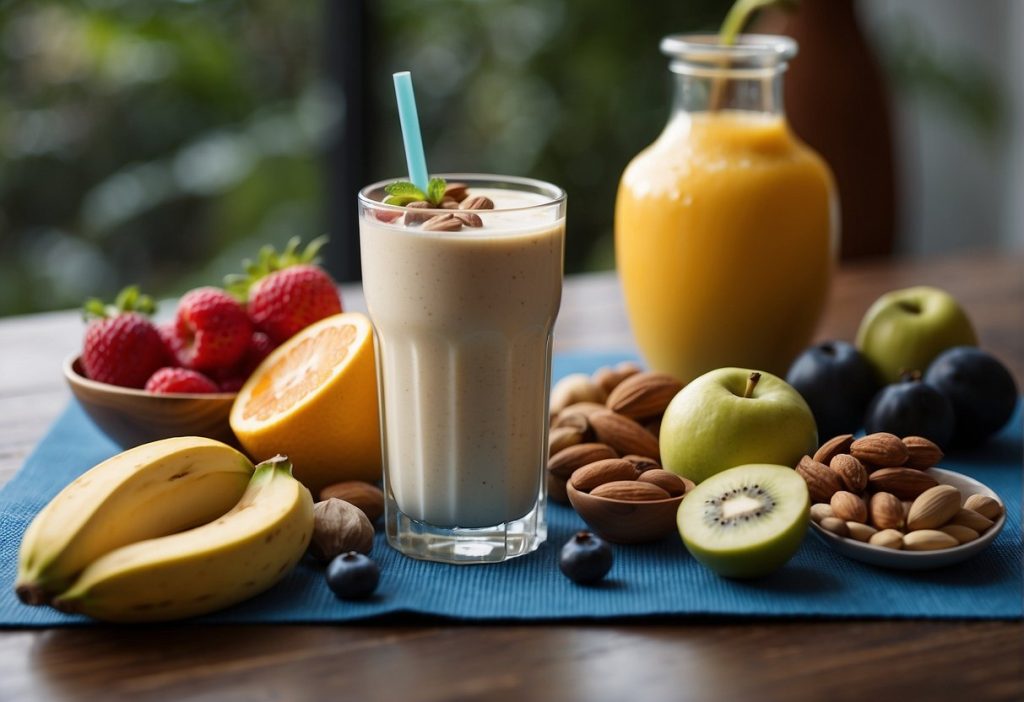
Sore muscles after exercise are common. They show that your muscles are adapting and getting stronger. Nutrition plays a crucial role in alleviating this discomfort and enhancing muscle recovery.
Causes and Effects of Muscle Soreness Post-Exercise Recovery
When you exercise, especially doing new or harder exercises, you damage your muscles. This damage is a natural part of the muscle-strengthening process. Delayed onset muscle soreness (DOMS) usually appears 12 to 24 hours after exercise. It can last up to 72 hours. Symptoms include:
- Stiffness: Typically peaks within the first 48 hours.
- Tenderness and Pain: Can make daily activities uncomfortable.
- Reduced Range of Motion: Due to stiffness and discomfort in the muscles.
- Swelling and Inflammation: Part of the body’s healing process.
How Proper Post-Exercise Nutrition Aids in Reducing Muscle Soreness
Your diet can dramatically affect the intensity and duration of muscle soreness. Proper nutrition aids in repairing muscle tissues and reducing inflammation. Essential nutrients like protein, omega-3 fatty acids, and antioxidants are pivotal.
- Protein is key. It gives your muscles the amino acids they need. You should consume it after a workout to help with repair. Example: Whey protein.
- Omega-3 Fatty Acids: These can help reduce muscle your body’s inflammatory response, potentially easing soreness. Sources: Fatty fish, flaxseeds, chia seeds.
- Antioxidants: Vitamins such as C and E can help your body clear free radicals produced during exercise. Foods: Berries, nuts, green leafy vegetables.
Staying hydrated is also key in recovery. It helps carry nutrients to your muscles and remove waste. In addition to water, electrolytes like sodium, potassium, and magnesium are key. They help maintain fluid balance and muscle function.
Muscle Protein Synthesis
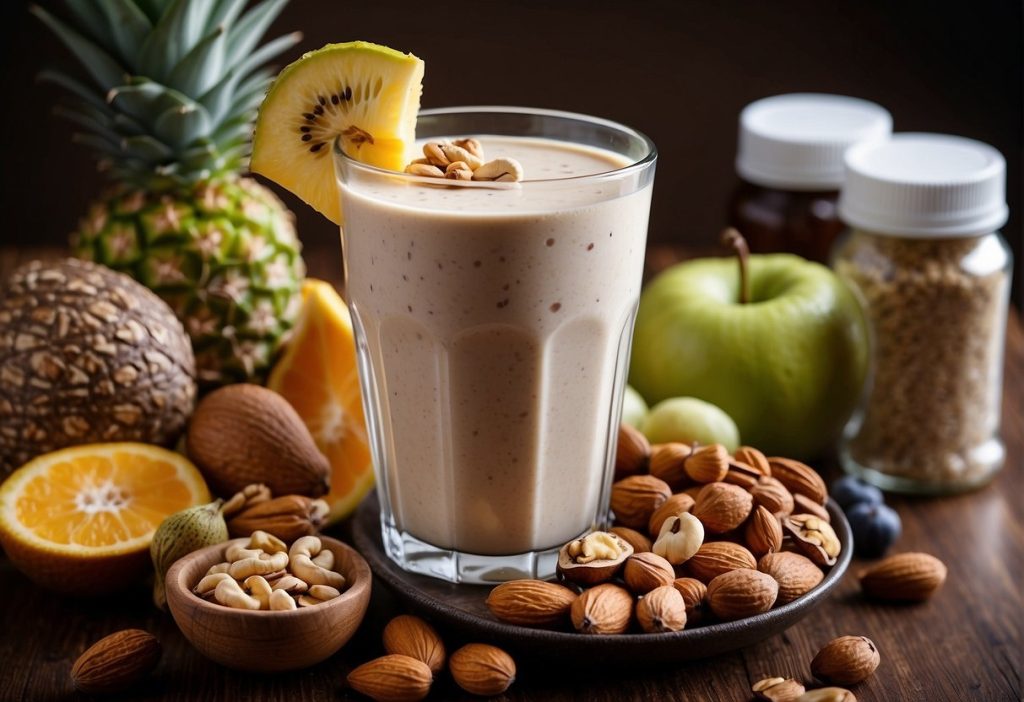
Muscle Protein Synthesis (MPS) is how your body builds muscle. It’s crucial after exercise for repair and growth.
Explanation of MPS and Its Role in Muscle Repair and Growth
MPS is your body’s way of fixing and building muscle fibers. Exercise damages them. After working out, your muscles are in a state of breakdown and need to rebuild to grow stronger. MPS works by making new proteins. They repair damaged muscle fibers, leading to muscle growth.
Key components involved in MPS include:
- mRNA (messenger RNA): Carries the code that directs the production of specific proteins.
- Ribosomes: Cellular ‘machines’ that read the mRNA and assemble amino acids into new proteins.
- During MPS, amino acids assemble to form the building blocks for proteins.
Factors Affecting MPS, Including Nutrition
Several factors can impact the rate and effectiveness of MPS:
- Amino Acid Availability: Without sufficient amino acids, from dietary protein, MPS cannot proceed effectively.
- Exercise Intensity: Resistance training at sufficient intensity can stimulate MPS more than less demanding activity.
- Timing of Nutrient Intake: Consuming adequate protein shortly after exercise can enhance MPS.
- Type of Protein: Digestibility and amino acid composition of the protein source can affect MPS. For example, whey protein digests fast. It has a lot of leucine. This is good for stimulating MPS.
It’s important to combine these factors optimally for effective MPS:
- Ensure regular protein intake throughout the day.
- Focus on high-quality protein sources, like dairy, meat, or plant-based proteins rich in essential amino acids.
- Include resistance training in your routine to trigger MPS.
Muscle Tissue and Repair
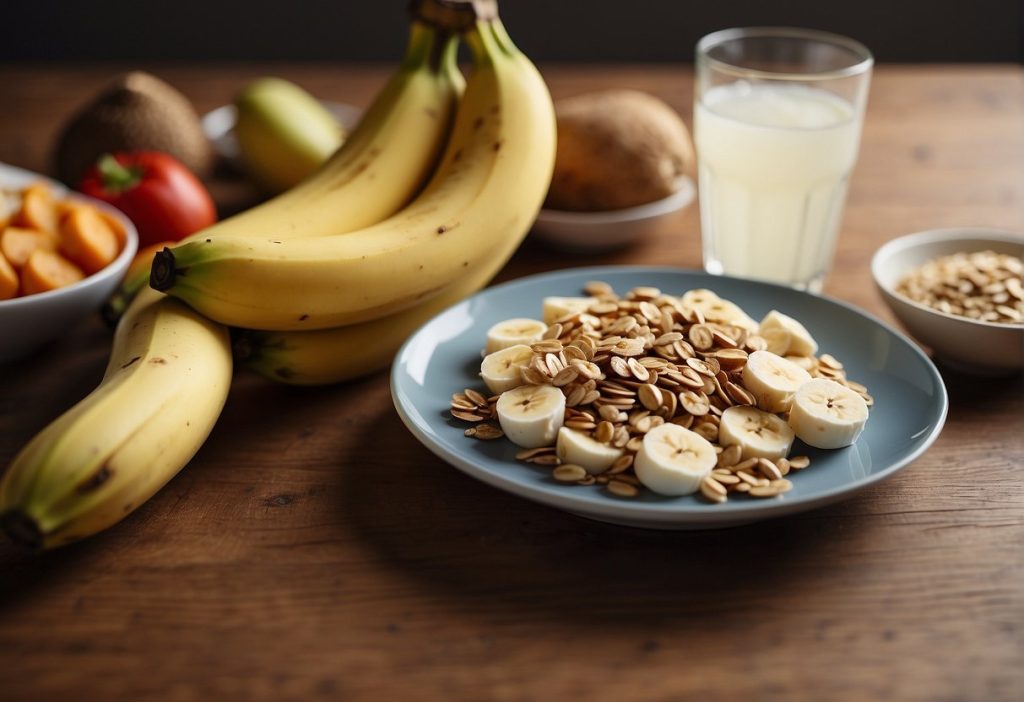
Your muscles undergo a constant cycle of damage and repair that’s crucial for muscle growth and recovery. Understanding this process can optimize your approach to nutrition and overall muscle health.
Overview of Muscle Tissue Composition and Structure
Muscle tissue is predominantly composed of protein fibers known as actin and myosin. Within these fibers, the smallest contractile unit is the sarcomere. This tidy arrangement causes muscle contraction. It sits in muscle fibers, which group into fascicles and then form the whole muscle.
- Actin and Myosin: The primary proteins that make muscles contract.
- Sarcomere: The structural unit of a muscle fiber.
- Muscle Fibers: The cells that form muscles, containing many myofibrils.
- Fascicles: Bundles of muscle fibers.
- Muscle Tissue: A collection of fascicles that make up the whole muscle.
Importance of Adequate Nutrition for Optimal Muscle Tissue Repair
Following physical activity, your muscles need various nutrients to begin the repair process. Amino acids from protein are crucial for the synthesis of new muscle tissue and the repair of micro-tears that occur during exercise. Additionally, carbohydrates are important. They replenish glycogen stores, providing energy for muscle repair and future workouts.
- Protein: Supplies amino acids necessary for muscle repair.
- Essential Amino Acids: Needed from the diet as they are not made by the body.
- Carbohydrates: Restores glycogen for energy replenishment.
In addition to macronutrients, micronutrients like vitamins and minerals also play big roles. For example, our bodies need Vitamin C to produce collagen. Collagen helps repair tissue. Minerals like magnesium and calcium are vital for muscle function and contractions.
- Vitamins: Vitamin C for collagen production.
- Minerals: Magnesium for muscle function, calcium for contractions.
Glycogen Stores and Replenishment
Glycogen is your body’s main carbohydrate storage. It’s mostly found in your liver and muscles. After prolonged or intense exercise, glycogen stores are significantly depleted. It’s crucial for you to replenish these stores to aid in recovery and prepare for the next bout of activity.
Immediate Post-Exercise: Aim to consume carbohydrates within 30 minutes after exercise to maximize glycogen synthesis. The recommended amount is 1.2g/kg of body weight.
Carbohydrate Choices:
- Simple carbohydrates (higher glycemic index)
- Examples: glucose, sucrose, or maltodextrin-based foods
- Complex carbohydrates (lower glycemic index)
- Examples: whole grains, starchy vegetables
| Carbohydrate Type | Time to Digest | Benefit |
|---|---|---|
| Simple | Fast digestion | Rapidly replenishes glycogen stores |
| Complex | Slower digestion | Provides sustained energy release |
Protein’s Role: Adding a bit of protein (0.2-0.4g/kg of body weight) with carbs can boost glycogen refilling. It can also boost muscle protein synthesis.
Hydration: Don’t forget to rehydrate. You should replace every 500ml of weight lost with at least 500-700ml of fluid.
Frequency: If you have many exercise sessions in a day or are in a competition, it’s good to refill glycogen stores every 2-3 hours. Focus on carbs.
By following these rules, your recovery will be faster. Then, you will do better in future workouts.
Recovery Nutrition: Frequently Asked Questions:
Q: What are the 3 R’s of recovery nutrition?
A: The 3 R’s of recovery nutrition stand for Refuel, Rebuild, and Rehydrate. Refuel focuses on refilling energy stores with carbs. Rebuild emphasizes eating protein to repair and rebuild muscles. Rehydrate means replacing lost fluids and electrolytes. You lose them during physical activity. This supports good recovery. By addressing these three components, you can effectively support your body’s recovery process.
Q: What nutrient is best for recovery nutrition?
A: Many people consider protein to be one of the best nutrients for recovery. It plays a crucial role in repairing and rebuilding muscles after physical activity or injury. Eating protein-rich foods or supplements can help muscles recover. They also promote healing.
Q: What speeds up recovery?
A: Several factors can help speed up recovery, including:
- Adequate Nutrition is key. It means eating a well-balanced diet. The diet is rich in nutrients such as protein, carbs, healthy fats, vitamins, and minerals. These nutrients can support the body’s recovery process.
- Hydration is key. Drink enough water and electrolyte-rich beverages. This helps recovery and reduces dehydration risk.
- Rest and Sleep: Getting enough rest and good sleep lets the body repair tissues. It is essential for optimal recovery.
- Active Recovery: Do light physical activity, like gentle stretching, walking, or low-impact exercises. It can boost blood flow and aid in recovery.
- Stress Management is about managing stress levels. You can do this through relaxation techniques, meditation, or mindfulness practices. These things can support overall recovery and healing.
By adding these factors to your recovery routine, you can speed up the body’s natural healing.
Q: How do athletes recover so quickly?
A: Athletes are able to recover quickly due to a combination of factors including:
- Athletes follow careful nutrition plans. These plans have the right balance of macronutrients (carbs, proteins, and fats) to support their recovery.
- Many athletes use special training techniques. They include active recovery, ice baths, and compression therapy. These techniques help reduce muscle soreness and speed up recovery.
- Athletes often have access to sports nutritionists and physical therapists. These professionals provide personalized recovery plans and treatments to support their rapid recovery.
- Consistent Rest and Sleep: Athletes prioritize good sleep. It lets their bodies recover from intense activity.
- Athletes may use advanced recovery tools. They may use tech, like cryotherapy, hyperbaric chambers, and massage therapy. These aid in their recovery.
Athletes can use these strategies and get professional support. This will help them recover faster and better. They recover after tough training and competition.
Q: Does magnesium help recovery?
A: Yes, magnesium plays a significant role in the recovery process. Muscle function involves it. It also helps make energy and proteins. These are crucial for recovery after physical activity. Magnesium also helps control muscle contractions. It supports muscle relaxation. This aid can reduce muscle soreness and cramping after exercise. Eating magnesium-rich foods or taking magnesium supplements may help the recovery process. This is especially true for athletes and active people.

